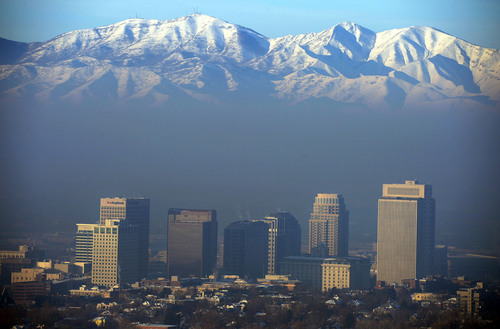This is an archived article that was published on sltrib.com in 2014, and information in the article may be outdated. It is provided only for personal research purposes and may not be reprinted.
A bipartisan group of Utah lawmakers last week laid down the marker by which the success — or failure — of the 2014 legislative session will be judged.
There are, as always, many important issues for the Legislature to deal with. Health care. Education. Transportation. Ethics in government. There will also be a raft of silly, retrograde or downright harmful ideas that will clog up the decision-making process.
But a clutch of 15 bills put forward by the House Clean Air Caucus addresses, in many different ways, the most serious problem the state faces. A problem that is obvious to anyone who visits Salt Lake City or its environs during the winter months. And that is that the air quality throughout the valley is unacceptable to any civilized society.
The proposals include such good ideas as allowing an increase in the local-option sales taxes that pay for public transit around the area, retrofitting old dirty vehicles and facilities in the public and private sectors, making it easier for utilities to provide charging stations for electric cars and banning medical waste incinerators from residential areas.
The most important proposal over the long haul — and fixing our air is a long-range challenge — is likely the one that would unleash the resources of the Utah Department of Environmental Quality to draft and enforce air-quality guidelines and restrictions that make sense in northern Utah's unique set of circumstances.
In a state where there is so much politicial capital to be raised by trashing the feds, it is indeed odd that current law basically forbids our own state agency to exceed the federal one-size-fits all limits. It is time for that to end.
The reason air pollution is such a problem here, the reason that cities along the Wasatch Front often vie for the dubious distinction of being most polluted city in the nation, is a horrible coincidence of meterology, geography and demography. There are a great many people living, driving and heating their homes here. There are days, usually in the winter, when atmospheric conditions trap all the pollution we generate in the valley where so many of us live.
The result is air that is unfit to breathe, that causes the old and the young and those with all manner of what might otherwise be minor health problems to suffer limitations and damages they would not have to deal with if they lived almost anywhere else. Which, increasingly, people are deciding to do.
Lawmakers must make this issue their number one concern this year.



